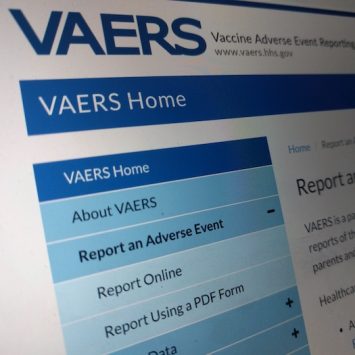‘Lazarus Study’ and Alleged ‘Vaccine Injuries’
As supposed evidence of vaccine harm, Kennedy frequently refers to what he calls the “Lazarus study.”
“Fewer than 1 in 100 vaccine injuries are ever reported because it’s voluntary,” he said in his interview with Rogan, referring to reports to the
Vaccine Adverse Event Reporting System. “You can find support for this in the Lazarus study. Lazarus actually looked and said, how many injuries are actually happening, how many are reported? And they said fewer than 1 in 100 are ever reported.”
He again referenced the work in an interview with Bill Maher on the podcast “Club Random with Bill Maher.” “What they found is that the actual rate of injury was about, I think, 2.3%, which is 1 out of every 37 people,” Kennedy
said.
Kennedy’s nonprofit, Children’s Health Defense, also frequently cites the analysis, as
we’ve written. But several aspects of these claims are incorrect or misleading.
First, the document is not formally a published study; it’s a 2010
final report by researchers with the nonprofit health insurance company
Harvard Pilgrim Health Care for a
project funded by the
Agency for Healthcare Research and Quality, a governmental agency under the Department of Health and Human Services. (The lead investigator’s name was Dr. Ross Lazarus.)
A screen capture of the VAERS website.
Second, what Kennedy is calling “vaccine injuries” are in fact adverse events, which are health issues that occur after vaccination but aren’t necessarily due to a vaccine. Many of them are coincidental. This is a prevailing misunderstanding about VAERS. (For more, see our article “
What VAERS Can and Can’t Do, and How Anti-Vaccination Groups Habitually Misuse Its Data.”)
VAERS works by collecting reports of possible vaccine side effects. Because these are voluntarily submitted, the database doesn’t include every real side effect that does occur. Anti-vaccine advocates often complain about this “underreporting.” At the same time, not all reported events were caused by vaccines, so there is also “overreporting.”
This issue is relevant to understanding the Harvard Pilgrim Health Care report’s findings. The scientists wrote a computer program to analyze electronic medical records, looking for certain prescriptions, lab tests and diagnostic codes that occurred within 30 days of a vaccine to identify possible vaccine side effects. The original plan was to then use this automated system to help medical professionals submit reports to VAERS.
The group identified, in data described as “preliminary,” 35,570 possible side effects after 1.4 million vaccine doses, or possible side effects occurring after 2.6% of vaccinations.
The key word here is possible. Although Kennedy presents these events as being caused by vaccines, that is not necessarily the case. (Later, in the Rogan interview, Kennedy does say they might not be vaccine-caused, but by that point, he had already repeatedly called them “vaccine injuries.”)
And while Kennedy’s language could suggest that such “injuries” are all serious, that’s also not the case. Elsewhere in the Harvard Pilgrim Health Care report, the authors state that “fewer than 1% of vaccine adverse events are reported.” This is the sentence Kennedy and others have long latched onto, using it to misleadingly argue that the problems reported in VAERS are only the tip of the iceberg.
It’s unclear how this was calculated, but Dr.
Michael Klompas, a public health surveillance researcher at Harvard Medical School and one of the authors of the report, told us in an email for an
earlier story that the 1% number “takes into account that many adverse effects of vaccines are mild and expected so not worth reporting (sore arm, fatigue, local redness, etc.).” It’s misleading to refer to this number without noting that it includes mild, expected side effects that people would rarely bother reporting to VAERS.
Other research has shown that VAERS more completely captures adverse events that are serious rather than mild.
The report, then, is not evidence that vaccines are dangerous, as Kennedy tries to claim. Instead, it describes one approach that could be used to improve reporting to VAERS, essentially changing it from a purely passive system.
Other government vaccine safety monitoring systems, it should be noted, are active systems that automatically collect data and do not rely on reporting, including the Vaccine Safety Datalink. The CDC and FDA purposely use multiple passive and active systems together for vaccine safety surveillance.
Misleading Claim About the National Childhood Vaccine Injury Act
In at least three different recent interviews, Kennedy has spun a misleading tale about the origin of the
National Childhood Vaccine Injury Act of 1986 to incorrectly suggest that vaccines are irredeemably unsafe.
In the 1970s and 1980s, vaccine makers were
increasingly being sued for
millions of dollars by parents for alleged harm to their children, many for certain neurological health issues claimed to be due to the diphtheria, tetanus and pertussis, or DTP, vaccine. Although studies would
later show that there was no link to the vaccine, vaccine companies
sometimes lost these cases in court. This led some companies to stop making vaccines altogether, running up the cost of vaccines and also increasing the risk of
vaccine shortages.
In recognition that vaccines are highly beneficial, but do rarely cause serious side effects, such as allergic reactions, the government stepped in and decided to give immunity in most cases to vaccine makers — and set up an
alternate compensation system for people with reasonable claims of harm. The law also required vaccine recipients to receive fact sheets about each vaccine and spawned
VAERS to function as an early warning system for detecting possible safety problems due to vaccines.
Kennedy’s version of the story, however, plays up the risks of vaccines.
“The reason the Vaccine Act was passed that gave immunity from liability to these companies is because they said the vaccines could not be produced — that they were unavoidably unsafe,” he
said in the podcast interview with Maher. “And that phrase is in the 1986 statute, and it’s in the Supreme Court Bruesewitz case, which upheld that statute.”
“Anybody who tells you vaccines are safe and effective, the industry itself got immunity from liability by convincing the president and Congress that vaccines are unavoidably unsafe,” he also said in his interview with Rogan.
This is misleading — and also wrong on the specifics. “Unavoidably unsafe” doesn’t mean, as Kennedy implies, that a product is really dangerous and shouldn’t be used. As University of California Law San Francisco professor
Dorit Reiss has explained in a
blog post, the legal term actually refers to a product that is considered to be highly beneficial, but that cannot be made entirely risk-free. (Safe and effective, it should be said, doesn’t mean perfectly safe and perfectly effective, either — a standard that no medical product would be able to meet.)
“Unavoidably unsafe” also
doesn’t appear in the 1986 law, as Kennedy claims. Instead, what the law says is that no vaccine manufacturer “shall be liable … if the injury or death resulted from side effects that were unavoidable even though the vaccine was properly prepared and was accompanied by proper directions and warnings.”
In the majority opinion for the Bruesewitz case, the phrase is only mentioned because it was part of an argument
that was rejected. The issue before that court, Reiss explains, was whether a plaintiff could sue for an alleged vaccine injury for a vaccine design defect in state court. This hinged on whether the 1986 law meant to invoke tort law’s “unavoidably unsafe” language. Most justices said no. “In other words,” Reiss told us in an email, “the majority of the court mentioned the phrase only to say it’s not a correct interpretation of the law.”
This brings us to Kennedy’s
claim in his interview with Maher that vaccine companies get immunity “no matter how negligent they are … no matter how reckless the behavior, no matter how shoddy their manufacturing and testing process is.”
This is false. Reiss told us that while the Bruesewitz case determined that someone cannot sue for a vaccine design defect, one can bring other claims against vaccine makers, including for manufacturing defects, negligence and fraud. Claims can be taken to state court, she said, if one first goes through the vaccine compensation program and it either takes more than 240 days for a response or one rejects the decision.
This is in fact exactly what Kennedy himself has done in
lawsuits against Merck over its HPV vaccines. “[T]hat shows that his point is untrue — and that he knows it,” Reiss said.
Robert F. Kennedy Jr., a prominent anti-vaccine advocate, is running for president as a Democrat. Our SciCheck team has combed through his recent interviews to identify and correct some of his most common health claims in a three-part series. In this first installment, we address several of his...

www.factcheck.org
:max_bytes(150000):strip_icc():focal(999x0:1001x2)/dylan-farrow-1-1-60a62dffd9e24a5abc4589cf8177e9a9.jpg)





